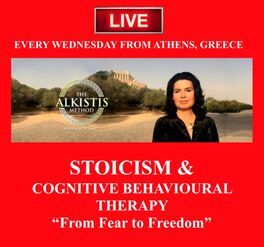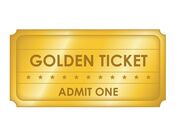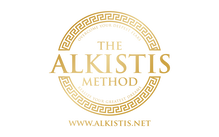How living according to Virtue & Ethos improves your chances of real success long-term. #StoicCEO29/11/2020
(This is part of an interview with Julian Roberts: The WHOLE interview premiers Dec 7th on https://www.julianrobertsconsulting.c... )
What factors really lead to success in business and in your personal life long-term? The Greek philosophers insist that it's living with Virtue & Ethos.
0 Comments
Drastically Reduce Fears & Insecurities in 15 min. with this exercise based on Greek philosophy19/11/2020
In this video you will be able to see demonstration of how to transform your fear, anxiety, anger into inner freedom, through Greek Philosophy (Socratic Method, Aristotle & Stoicism) and CBT (Cognitive Behavioural Therapy).
With the Socratic method ( described as the foundation of Cognitive Behavioral Therapy)— the therapist/coach asks a series of focused, open-ended questions that encourage reflection. By surfacing knowledge that was previously outside of our awareness, the technique produces insightful perspectives and helps identify positive actions. “I know you won’t believe me, but the highest form of human excellence is to question oneself and others.” - Socrates CBT is a way of focusing on the cognitive processes that produce feelings. The approach helps by changing people’s behavior and attitudes with a deeper understanding of thoughts, images, beliefs, and attitudes. Attitudes grooved in neural pathways during childhood become automatic thoughts. The thoughts resulting in disruption in daily life are negative thoughts around situations that created them. CBT allows patients to interrupt these thoughts with a deeper understanding of the errors or distortions in the perception of these automatic thoughts. This type of therapy helps patients to correct misinterpretations of the thoughts that have caused disruption in their daily lives. TO JOIN NEXT WEDNESDAY go to www.alkistis.net/freedom.html What are your 3 biggest complaints in your life? & How to overcome your frustration in 20 minutes.12/11/2020 What are your 3 biggest complaints in your life? Watch this video to find out how to overcome your frustration in 20 minutes. To join our next Wednesday session go to www.alkistis.net/freedom.html where you'll be able to send me your particular issue and I can 'process' it with you LIVE. The word 'Cemetary' comes from the Greek word "kimisis" ie to sleep...Join me on a walk in a cemetary in Athens, where I share the Stoic teaching of "Memento Mori" Memento Mori is Latin for “Remember death.” The phrase is believed to originate from an ancient Roman tradition in which a servant would be tasked with standing behind a victorious general as he paraded though town. As the general basked in the glory of the cheering crowds, the servant would whisper in the general’s ear: “Respice post te! Hominem te esse memento! Memento mori!” ie “Look behind you! Remember that you are but a man! Remember that you will die!” Such reminders and exercises take part of Memento Mori—the ancient practice of reflection on mortality that goes back to Socrates, who said that the proper practice of philosophy is “about nothing else but dying and being dead.” 
“Let us prepare our minds as if we’d come to the very end of life. Let us postpone nothing. Let us balance life’s books each day. … The one who puts the finishing touches on their life each day is never short of time.”
-Seneca HOW TO THINK LIKE AN OLYMPIC CHAMPION #Fear2Freedom Apply 3 Golden Principles of #GreekPhilosophy8/11/2020 How can you lead others, if you can’t even lead yourself yet? On the outside, you may appear strong, successful and confident. But on the inside, you often feel frustrated, angry and anxious, plagued by deep fears, that you may not even be conscious of. According to Aristotle, one of the greatest philosophers of all time, most people have variations of these five fears: “I’m afraid that I won’t achieve anything important in my life.” “I’m afraid that I’ll end up all alone.” “I’m afraid that I’ll get very sick.” “I’m afraid that I’m going to die.” “I’m afraid that I’ll be poor.” Which one sounds most like you? In this video you will practice a method worthy of Olympic Champion training. First, listen to what participants of my webinar #Fear2Freedom have to say about the positive results that #TheALKISTISmethod has on them even in one session of 40 minutes. #RapidResults.... Then, book your seat for the upcoming Wednesday! Video clip from last night's Q & A: Daniel Goleman, Harvard Professor of 'Vital Lies, Simple Truths' wrote about how the lies we tell ourself are holding us back: But actually it was Socrates who first taught about how we are constantly lying to ourself, and taught CRITICAL THINKING; This is the Socratic Method; Asking critical questions to ourself and others to determine the OBJECTIVE TRUTH...This was also the beginning of the 'Scientific Method', and is why ancient Greece is the origin of Western Civilization. The Greek de-mystified thinking, leading to a clarity through rationality. Modern psychology, especially CBT (Cognitive-Behavioral Therapy) is rooted in the Socratic Method of "Critical Self-Inquiry". The ALKISTIS Method is an integration of Greek philosophy and modern neurocoaching & CBT. CBT is a way of focusing on the cognitive processes that produce feelings. The approach helps by changing people’s behavior and attitudes with a deeper understanding of thoughts, images, beliefs, and attitudes. Attitudes grooved in neural pathways during childhood become automatic thoughts. The thoughts resulting in disruption in daily life are negative thoughts around situations that created them. CBT allows patients to interrupt these thoughts with a deeper understanding of the errors or distortions in the perception of these automatic thoughts. This type of therapy helps patients to correct misinterpretations of the thoughts that have caused disruption in their daily lives. TO JOIN NEXT WEDNESDAY go to www.alkistis.net/freedom.html You are invited to join every Wednesday. Find out more here www.alkistis.net/freedom.html Click on this video to free yourself from Self-Deception & Lies within 40 minutes with this simple 3-step 'filtering' method. Today I discuss about Stoicism, Greek philosophy & the 4 Cardinal Virtues as moral framework, as well as the importance of love. Historians can’t agree on where this classification originated. It appears to go back as far as Plato or Socrates, although some argue that they can be traced back to about the 12th-8th centuries B.C., to Homer’s epic poems, The Iliad and The Odyssey... -phronêsis (Practical Wisdom - knowing good from bad) -dikaiosunê (Justice, fairness, and kindness in our relations with others.) -andreia (Wise courage and endurance in response to our pain and anxiety.) -sôphrosunê (Temperance - Wise self-discipline in response to our desires.) It's important to understand that the ancient Stoics would not have recognised the modern distinction between religious thought and scientific inquiry. While there were religious aspects to its practice, ancient Stoicism was a philosophy not a religion. There was no religious-based leadership hierarchy nor an appointed authority, place of worship, or sacred books. However, there were various heads of Stoic schools whose ideas followers could openly question or reject on the basis of reasoned argument without fear of being labelled an apostate, even when contesting aspects of Stoic theology. This is because the Stoic God, as the very essence of Nature, was envisioned and arrived at through a naturalistic and rational framework that formed the basis of Stoic virtue ethics and provided practitioners with the rationale to study the natural world and the wider cosmos, including the celestial bodies (which were often referred to as gods). This is in effect what the eclectic, but Stoic influenced, Cicero explains in On Ends: "Nor can anyone judge truly of things good and evil, save by a knowledge of the whole plan of nature and even of the life of the gods." The nature of the Stoic God will certainly conflict with the fundamental aspects of religious traditions, especially those associated with “miracles” and other supernatural events, states or beings, including heaven, hell, demons, or angels. The ancient Stoic understanding of the universe, including God, is entirely grounded in natural phenomena that can be scientifically explored. As such, the Stoic God has a clear philosophical basis, which necessarily must be arrived at and defended via rational argument, not faith or dogma. This is clear from the Chrysippean “proofs” for the Stoic God, which are based on reasoned argument about the nature of the universe as understood by Stoics. One such argument is as follows: "If the gods do not exist, nothing in the universe can be superior to humans, the only beings endowed with reason. But for any human being to believe that nothing is superior to his or herself is a sign of insane arrogance. There is then something superior to humankind. Therefore, the gods exist." The ancient Stoics recognised, through their theology and not in spite of it, that the best possible life a human can be expected to have relies on thinking and acting in accordance with Nature and by the facts Nature provides. In no way does it depend on or imagine divine revelations from a supernatural being that harbours desires for you to join “him” in an afterlife. For example reflecting on Seneca’s On Providence, 2.4, we can see that: "Death, disease, and natural disasters are not punishments from an angry God; they are simply the natural unfolding of events within a web of causes, often outside of our control." Stoics accept that the cosmos is as it should be and they face challenging events as opportunities for growth rather than considering them harmful. This is neither resignation nor retreat from the realities of human existence. Stoics strive to do all we can to save lives, cure disease, and understand and mitigate natural and man-made disasters. Consequently, Stoic reverence for Nature is deeply connected to Stoic theology, which makes it clear that the Earth’s natural system, as the giver and sustainer of life (words typically used to describe a god), is worthy of care and consideration. That said, philosophically speaking, although there are some similarities, the Stoic God is not analogous to Spinoza’s God, the deep ecology spirituality envisioned by Arne Naess, or James Lovelock’s Gaia Hypothesis (see Whiting and Konstantakos). Stoicism is not a call to faith, not even a call to faith in science. Rather, it is a commitment to the observations and empirical evidence we require to seek harmony with the universe and within our inner self. Watch today's video to find out more... This exercise from my book, "From Fear To Freedom" will help you get a clearer idea of the ideal version of your future. It defines your “Ithaca”, the end experience that you want to achieve. This exercise will help you in three ways: First, to define this future vision with more precision, so as to help you take a decision. Decision means precision. Precision focuses our energy. Second, to choose the best path which suits your life’s reality. Third, the clearer you are, the easier it will be to recognise the “Telos” (your desired result) when you see it. This Askesis is not meant to bind you to a certain result, but to help you become more specific. No one can know what the future holds, and of course you can alter or tweak your vision along the way. So go ahead and don’t be afraid to declare what you want- your Ithaca. FOR MORE INFO CLICK HERE
On the outside, you appear strong, successful and confident, but on the inside, you often feel frustrated, angry and anxious, overwhelmed by life’s relentless onslaught of details, problems, alternatives and considerations...
You lie awake at night thinking: -How can I fulfil my greatest potential? -Am I living my life to the fullest? -How can I have a more meaningful life? -How can I make a positive difference in this world? This feeling of ‘being stuck’ can cause havoc in our personal and professional life. The question is: Have you had enough yet? Are you ready to gain clarity, unleash the best version of you, understand what’s important and make the right decisions - the ones that will lead you to real success and happiness? If so, then you are at the right place and time to take charge of your career, your life and most importantly, yourself. I mentor professional women on improving their MINDSET and STRATEGY for their important life & career transitions. The #AlkistisMethod is about asking asking yourself 3 questions regarding your core beliefs 1) Is it true? Is it Kind? Is it useful? , based on the 3 Golden Principles of #GreekPhilosophy (Ethos, Pathos, Logos). Inspired by the Socratic Method of Self-Inquiry. If you would like a short session with me, I have 'open Q & A' on WEDNESDAYS. |
TRY MY 3-STEP METHOD FOR YOURSELF THROUGH THIS FREE
VIDEO-COURSE: Archives
January 2025
Categories
All
|
|
All Rights Reserved 2019 Alkistis Agiorgiti
|



 RSS Feed
RSS Feed
